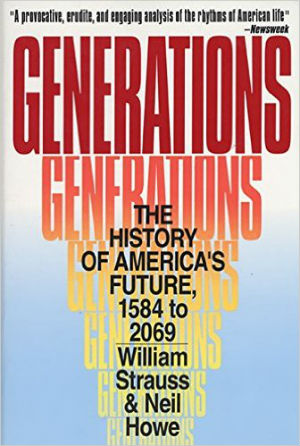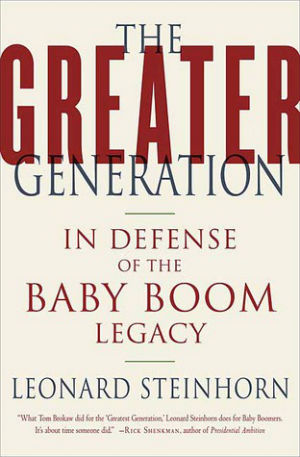‘Here Come the Baby Boomers!’ – 70 Years Later
By Neil Earle

The year 2015 was particularly rich in important historical associations, such as the end of World War II and the memories it evoked.
When Kathleen Casey-Kirchking was born just seconds past midnight on January 1, 1946 she unwittingly kicked off another major social and cultural event, the arrival of the Baby Boom generation. There would be 3.5 million born in 1946 just in the United States, of whom 2.5 million are still alive. Between 1946 and 1964 there would be some 80 million of us. Coming of age in the 1960s, the Boomer influence on politics, race, gender and sex, music and societal change – everything from Ban the Bomb to seat belts – would be vast, even history-changing.
I’m one of them. It’s hard to be objective but two social scientists, Neil Howe and William Strauss, already performed yeoman service in their 1999 study Generations charting five distinct generational patterns playing out in our society right now. Howe and Strauss have been worked over by the critics, of course, but we offer it here, with adjustments, as a possible key to help us understand how and why our society has become so complicated and conflicted and suggesting some ways to work our way out.
Here is the theory:
The “Veterans” Generation (born 1902-1924): Saluted by Tom Brokaw in The Greatest Generation, this is the group that endured a Depression and fought a world war and turned abound to face the Cold War. This was the ultimate can-do” civic generation represented to a “T” almost by former President George H.W. Bush and Canadian born Joe Schuster who helped invent “Superman” in the 1930s. Remember Superman hid behind the guise of mild-mannered Clark Kent and those who stormed the beaches of Normandy usually shy away from the “hero” label. They’re fewer of them now but poppies and November 11 can still pull at them.
The Adaptatives (born 1925-1945) These are the quiet, effective community builders, valuing competence and institutions that work. William Shatner of Montreal who captained the star ship “Enterprise” is a good representative as the ultimate “whatever it takes” problem-solver from this cohort. Anne Murray of Springhill, Nova Scotia has sensibly never forgotten her rural roots and first female Governor General Jeanne Suave hails from this cohort. Quiet effectiveness seem to be their motto. Just think of Ambassador Ken Taylor of the Iranian hostage caper in 1979.
Baby Boomers (born 1946-1964): The largest generation in North American history.
The soldiers came home, married their girlfriends and had lots of babies. The Boomer generation is usually considered rebels except that their generation was so large it split into two wings perhaps epitomized by liberal leaning President Bill Clinton and conservative George W. Bush. Margaret Trudeau and Rex Murphy are perhaps Canadian exemplars of this free-wheeling dichotomy. These are the kids who grew up quietly watching Howdy Doody, buying Davy Crockett hats and following teen heart-throbs such as Paul Anka before exploding across the campuses of the 1960s. The Boomer hallmark is the questioning of received traditions. The movie quip, “What are you rebelling against?” and the reply “What have you got” is almost a motto.
Generation X (born 1964-1981) Almost the anti-boomers. Raised in an age of limits thanks to the energy crisis. Born survivors, they helped make “staying alive” the hit of 1979. They learned to heroically go it alone. Runner Terry Fox trying to sprint across Canada in 1980 to raise cancer awareness and young Michael J. Fox embracing free-enterprise individualism on “Family Ties” in the era of Ronald Reagan are standard-bearers. “Just do it” and “go for it” seems to be their favorite slogans.
The Millennials (born 1982 to now). We are hearing more and more about them as they come to responsibility and prominence in the 21st century. They have been the beneficiaries of the “return to values” trend of the 1980s leading to smoke-free environments, Neighborhood Watch, soccer classes, activism against drugs and AIDs. Their mantra is “making a difference” and they may begin the civic-minded cycle all over again. Not as reactive as Xers or as idealistic as Boomers, they have a legacy yet to write but are notable for high rates of voluntarism and quiet but steady community involvement, especially in seeking out careers in law-enforcement. A watchword is “authenticity” in leaders and institutions.
There it is, the Generations Thesis. Now all theories leak badly at the edges but just think of the challenge it is for civic leaders, counselors, pastors and employers to deal with even some of these generational realities.

The Boomer Legacy
Interestingly, in 2006 academic Leonard Steinhorn authored a book titled The Greater Generation: In Defense of the Baby Boom Legacy. There the author claimed that the accomplishments of his age group were greater than even the Greatest Generation. Steinhorn got this bold idea when one of his Millennial students asked in class what the Baby Boomers ever did except take drugs and stage arrogant protests. When Steinhorn ticked off in response a standard checklist of women’s rights, ethnic diversity, sexual equality, more democratic workplaces, environmentalism and a commitment to greater personal freedom his bright student was surprised. All of these were hard-won rights done often in the face of opposition or apathy from other generations. Boomer hero Martin Luther King, Jr. said it well, “Progress does not come rolling in on wheels of inevitability.”
There was nothing visibly heroic about what the Boomers accomplished, at least in the sense of the war memorials that dot our cities, argues Steinhorn. Most of the victories came through hard tedious slogging and argumentation from the court house to the halls of Parliament or being heroic as part of a team. Think of hockey great Bobby Orr (born 1948) and his work with young people or the countless consumer advocates who have helped us out – those more than John Wayne. The changes got made. Not that everyone agreed with all the changes, just as we can’t expect the Lawrence Welk generation to understand all the fuss about the death of David Bowie or nor those who tout “short back and sides” as the ideal hairstyle to not look askance at dreadlocks. But slowly and relentlessly things do change. There was a time in the 1970s when hair lengths and skirt links caused friction in schools and at the workplace. Now the Yul Brynner look is in and long shaggy hair is relatively rare.
Against the Status Quo
When Steinhorn makes a list of how the Boomers changed things, it can seem a bit sweeping and a tad overstated but it is worth rehearsing. As he records: “Demeaning and bigoted habits of speech – discredited. The sexual double standard – confronted. Deference to white men – challenged. Discrimination against anyone outside the mainstream – rooted out. Imposing religious values – rejected. The command and control workplace – discarded. Sexual harassment – outlawed. Entrenched authority – held accountable. Smoke-filled politics, cronyism, secrecy in government – unmasked. Toxic run-off and belching smokestacks – no longer tolerated.” And most of this was done, adds Steinhorn, over entrenched complacency.
He is writing widely and perhaps sweepingly but it is worth pausing in this foundational year for so many North Americans to grasp a little more deeply how much our societies have changed and why. The changes haven’t all been good or even beneficial as some of our escalating social problems such as grass-roots drug addiction and growing in-school violence shows. But if we grasp that great lesson of seeing where the other group is coming from, appreciating people right where they are, then maybe more of us will embrace that national ideal of peace, order and good government. After all, one of the death-knells for any group or society is the faded slogan, “But that’s the way we’ve always done it.” In a world moving at the speed of Twitter this is worth at least considering.
 Margaret MacMillan
Margaret MacMillanComing Together?
On a personal level I’ve noticed as I get older how much I resemble my parents more than my students. In other words the Veteran and Boomer generations have more in common than not. Canadian historian Margaret MacMillan recently wrote of this in The Wall Street Journal. She sees that there is a grudging admission by Boomers that the G.I. generation had done so so much, investing in infrastructure (needing repairs) and building institutions to strengthen societies at home and abroad (multiculturalism and NATO).
This point was reemphasized for me in a USA Today article just after the terror attacks of September 11, 2011. A baby boom mother was reflecting on how at most arenas and mass public events people were singing “God Bless America,” and even “America the Beautiful.” Some still do. When her children looked at her with some bemusement as she heartily sang these unofficial anthems, she realized that her children did not know the words. Then she remembered where she had learned them – from her parents, the “Saving Private Ryan” generation. And she breathed a word of thanks and a resolve to pass these things on to her millennial kids.
Perhaps, as MacMillan added, the controversies and divisions and feuds and frettings of the contentious present are wearing us all down a bit, challenging all of us grow up a little, at least enough to learn that – going forward – we are all in this thing called society together and there are no absolute winners in the culture wars.